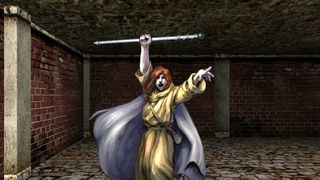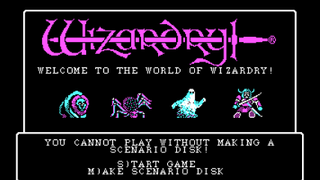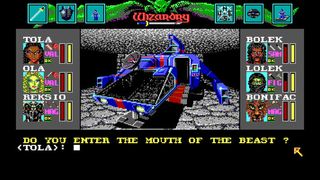There's still hope for the future of this 42-year-old RPG series, despite its brush with NFTs
The iconic Wizardry games may still return in a more faithful form.

This article first appeared in PC Gamer magazine issue 388 in September 2023. Every month we run exclusive features exploring the world of PC gaming—from behind-the-scenes previews, to incredible community stories, to fascinating interviews, and more.
The name Wizardry still carries weight, which is probably why the recent announcement of Eternal Crypt: Wizardry BC—a blockchain-based clicker game and NFT platform—went down like a lead balloon. A sad sign of the times, perhaps, but a good excuse to talk with Robert and Norman Sirotek, the brothers behind Sir-Tech, publisher of the most influential RPGs of the 1980s.
It's hard to imagine a world without Wizardry. The first game, Proving Grounds of the Mad Overlord, released in 1981 for the Apple II before being ported to almost every platform of its era, is one of the key foundational works of the medium. Even in its original form it's intuitive, accessible and (to anyone who's played a dungeon crawler) immediately familiar.
Wizardry had players roll a party of six adventurers and send them into a deadly grid-map labyrinth full of monsters, traps and the occasional puzzle. While there was an evil wizard lurking at the bottom to defeat, that RPG grind for XP, gold and gear was the core appeal. Wizardry pioneered a lot of what's now standard in both western and Japanese RPGs: parties, distinct battle screens, characters able to change class as they levelled up, spells following a simple naming structure.

I asked the Siroteks what defined Wizardry for them and what sets it aside from its peers of the time. They, in turn, quoted 'digital antiquarian' Jimmy Maher on the series, "For all its legendary difficulty, Wizardry requires no deductive or inductive brilliance or leaps of logical (or illogical) reasoning. It rewards patience, a willingness to experiment and learn from mistakes, attention to detail, and a dedication to doing things the right way." That intuitive appeal led to Wizardry catching the eye of some of Japan's earliest games distributors, but Sir-Tech was adamant that it wanted to retain creative control.
"We've got to give ASCII a lot of credit, but part of the reason why we did so well in Japan is when they came to us, they said, 'We want to market it and we want to license it,' and we said, 'No, we want to control it. We want to be in control of our own destiny, so why don't we do a distribution deal?'" says Norman Sirotek. "They agreed, and we had to deliver them the finished product in a box, shrink-wrapped and ready to go. We flew our developers out to Japan and they spent six or seven months there, converting it to about seven different computers."
Sticking to its guns is likely what gave earlier Wizardry games such a strong identity worldwide. Sir-Tech's core Wizardry games are split up into two distinct series: the original five are pure dungeon crawls where characters are expendable but free to be ported between games. Wizardry 4: The Return of Werdna is the awkward middle child. Brutally hard, but interesting because it cast players as the original's evil wizard antagonist. Players assembled teams of monsters to fight against NPC heroes reportedly based on player data recovered from discs sent into Sir-Tech. It was also the first in the series (and one of the first games ever) with multiple endings, including good and evil routes, plus a well hidden secret ending that demanded deep knowledge of kabbalistic lore to uncover.
ASCII nicely

Japanese publisher ASCII would go on to make new games under the Wizardry brand through the PlayStation 2 era before selling on the license. Back in the west, Wizardry 6 through 8 became more complex and story-driven. With a science-fantasy setting created by new director/ designer David W Bradley, space travel, furries and cosmic gods defined the tone, far from Wizardry's D&D-lite roots. While Bradley was the key figure credited for the first two (released in 1990 and 1992 respectively), the ambitious finale wouldn't surface until 2001, helmed by Linda Currie and Brenda Romero (Braithewaite, at the time), two now-highly influential women in the industry who started out running the Wizardry phone hint-line in the early '80s.
The biggest gaming news, reviews and hardware deals
Keep up to date with the most important stories and the best deals, as picked by the PC Gamer team.
We plan to stay true to our roots and keep it authentic.
Robert Sirotek
With Wizardry 8 intended to be the final game in the series, Sir-Tech once more turned to Japan to keep the brand alive, selling the trademark and the rights to the later games. The buyer was a major player in Japanese online gaming, but the Wizardry brand wasn't turning as many heads as it hoped. The rights were sold again, and licensed out to various parties over the years. A Japanese company called Drecom bought the IP in 2020, bringing us to the blockchain proposition that went over about as well as a curdled milk chugging contest. But there is some hope for Wizardry's future—or maybe more accurately, its past. The Siroteks still have the license for the first five games, and there are plans in motion to use it. At the very least, it sounds like they'll be going in a different direction than Drecom.
"It's really their choice, and not a matter for me to cast judgment on," Robert Sirotek says diplomatically. "But we have our own designs and directions for Wizardry. Specifically Wizardry 1-5, and we plan to stay true to our roots and keep it authentic. If Drecom wants to go down that road, more power to them, but it's not where we want to go with it."
Despite Wizardry's stagnation, fans of the genre it defined are eating good. The PC has been blessed by the remastered Etrian Odyssey series, the excellent Undernauts: Labyrinth of Yomi and the overwhelmingly systems-driven Labyrinth of Galleria: The Moon Society in just the last two years. If building a party of expendable fools to die in dungeons is your thing, you're spoilt for choice. Whether or not the Wizardry brand is revived (or someone drags it to the temple for a cheap resurrection) almost feels beside the point. But it sounds like Wizardry's original masters are gearing up to venture into the dungeon once again.

The product of a wasted youth, wasted prime and getting into wasted middle age, Dominic Tarason is a freelance writer, occasional indie PR guy and professional techno-hermit seen in many strange corners of the internet and seldom in reality. Based deep in the Welsh hinterlands where no food delivery dares to go, videogames provide a gritty, realistic escape from the idyllic views and fresh country air. If you're looking for something new and potentially very weird to play, feel free to poke him on Twitter. He's almost sociable, most of the time.

Path of Exile 2 is already one of the top 20 most played games in Steam's history even though it's in early access and all the servers have been on fire

Path of Exile 2 players are finally getting into the game: 'What we are doing right now is letting in players in batches so that we can make sure to monitor the backend and not overload it'
Most Popular


